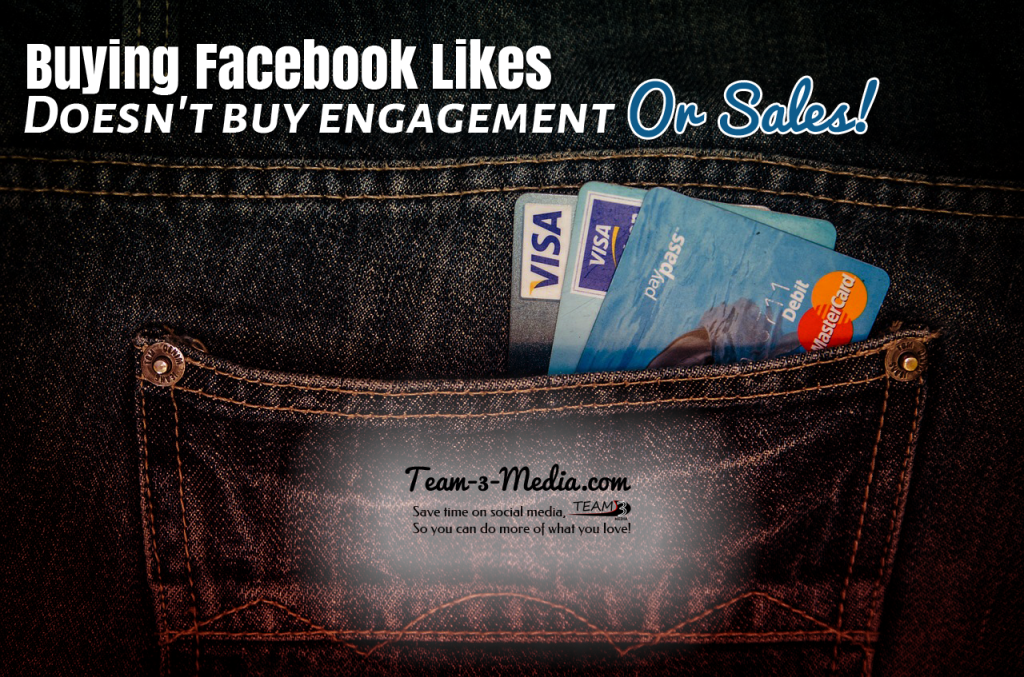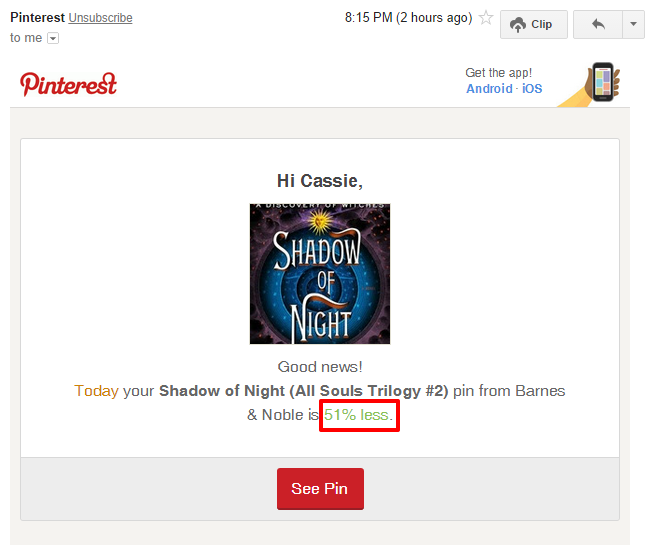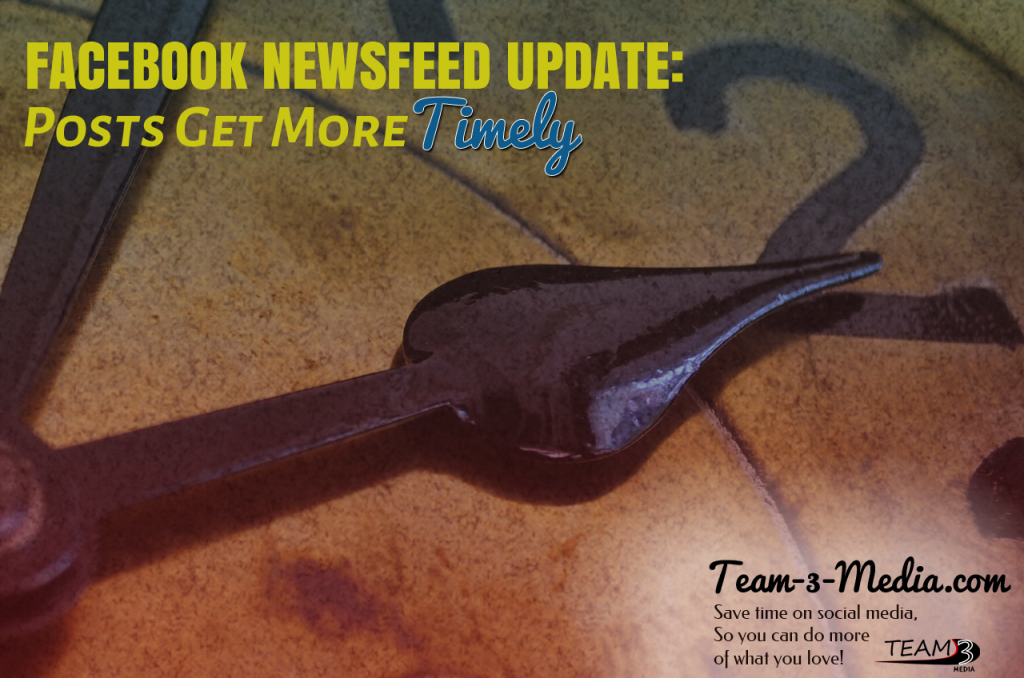Buying Facebook Likes Doesn’t Buy Engagement or Sales
I know you’ve seen the ads, or even just h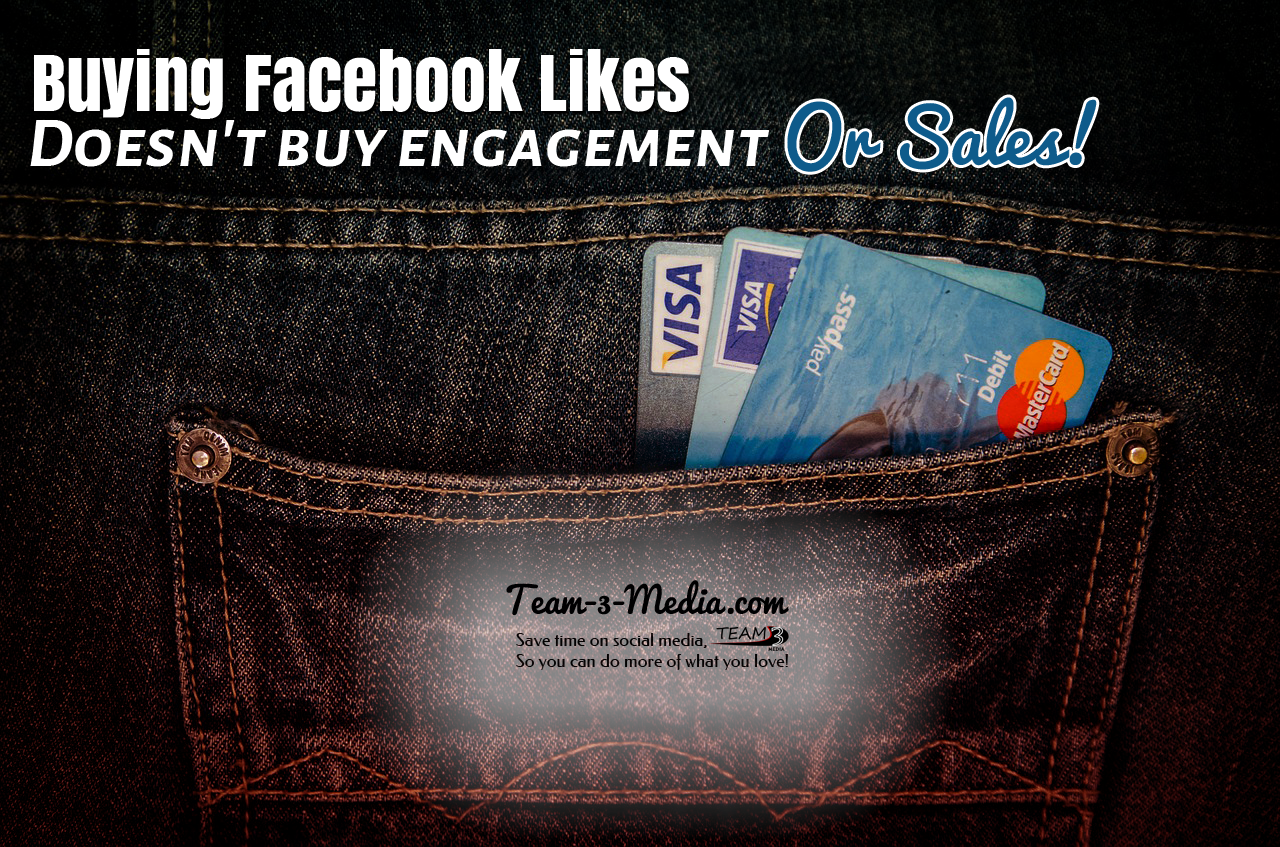 eard about “buying Likes”. At first it sounds like a good idea, especially if you’re having a hard time building those fans. Why not plunk down $25, $50, maybe even $200 if it will get you a bunch more fans all of a sudden? Wouldn’t that mean that more people are willing to Like your page, because they see that a lot of other people already Like you? While this is certainly true, the cost of buying those Likes goes way beyond the initial payment you made. Let me tell you a story as an example.
eard about “buying Likes”. At first it sounds like a good idea, especially if you’re having a hard time building those fans. Why not plunk down $25, $50, maybe even $200 if it will get you a bunch more fans all of a sudden? Wouldn’t that mean that more people are willing to Like your page, because they see that a lot of other people already Like you? While this is certainly true, the cost of buying those Likes goes way beyond the initial payment you made. Let me tell you a story as an example.
When I went out on my own for the first time it took me a while before I got an actual “social media management” client. I had taken other jobs, but no one wanted to pay me the money to manage their posting and engagement. This type of work requires a high-level of trust. Even though, I had four years experience doing this for multiple companies, I hadn’t been networking long enough to convince someone to take this over. Finally, though, I landed my first client. We talked over strategy and what types of posts I’d be running, as well as ideas on how the business could help to supply some of that content, since they were out doing the job every day. We agreed on a number of posts per month and the type of content that would run. I was stoked. After so long pitching and not getting anything, the actual “strategy session” was a breeze.
So, off I went. Like a good little social media manager, I grabbed content from other sites and their own, mixing it together in the right combination like a wizard mixing a potion. Then I scheduled the posts and waited for the engagement to happen. I wasn’t worried about the engagement. After all, I could see how many Likes they had. From my previous experience, I knew that this was a very good number for engagement. I also knew that it might take a little time for the engagement to pick back up since they hadn’t posted in a while. I checked the Page everyday and all I heard was crickets. There were a few Likes here and there, and even a comment, but nothing like what I expected. At the end of the month, I reported the stats and mentioned in my report that it would take a little time for the engagement to pick back up.
During the second month, the same thing happened. We got a bit more engagement, but, again, it was not what I expected. I also checked the reach of the posts and noticed that it was much lower than I anticipated. My second month’s report looked pretty much the same as the first. The business owner didn’t say anything. For the third month’s content I really dug into what was getting the most engagement, and when it was getting the most engagement, and tried to recreate that. Again, though, the same thing happened. I was devastated. This had never happened before. I had always been able to create content that people responded to and build on that.
So, before I delivered my third month’s report, I asked the business owner if we could meet. When we sat down I explained the problem to him. I outlined what had happened and why it was such a weird issue. Then I asked the question, “Did you pay for some of your Likes in the past?”
The owner paused for a second and said, “Yes, is that bad?”
Why Buying Likes Doesn’t Buy Engagement or Sales
Those Likes that you buy are sold by companies who do two different things: they create bots that act like real humans which create Facebook accounts and then Like pages, or they are actual human beings that are paid to click Like. Oftentimes these Likes come from countries such as Indonesia. If you’re a small business owner in the Midwest who only has a brick and mortar location and no online store, are people from that country really interested in what you sell?
Don’t be fooled by the ones who say that they are selling you “real Likes”. Even if a human is clicking Like on your business page, it doesn’t mean that they are interested in your product. Be smart, and get Likes that will become part of your customer base.
And the last reason that buying likes is bad for your business, is that many of these likes will never engage with your Page, so you’re getting nothing out of them. How does it look if someone comes to your Page, sees you have 1,000 likes, but only a few likes, comments, and shares on your posts over the last month? Seems pretty weird, huh?
Is there a Way to Legitimately Buy Likes?
Yes, there is. Facebook has a specific ad type that aids you in getting more Likes for your Page. If you know what you’re doing with the targeting you can even target those people who are going to be more interested in your product or service. This is one of the best ways to “buy” Likes. Don’t, however, buy them off some guy on Fiverr or another site that is promising x number of Likes. Those sites are likely using Like Farms to get you those Likes.
What About Other Ways to Get Facebook Likes?
There’s a ton, actually. You can install a Like button on your website where visitors can Like your Facebook Page without ever leaving. You can invite your friends and business colleagues to Like your Page. You can, even, promote your Page on your business cards or other print marketing pieces. Here are 20 more ways you can legitimately get Facebook Likes.
The bottom line: don’t be tempted to build your Facebook Page by buying Likes. You are only hurting yourself in the long run, especially if you want to get more out of it (like sales).
Pinterest Will Sell Your Products for Free?!

So, I, as usual, was looking through my email before I went to bed. A bad habit, I know. It usually keeps me up long past when I wanted to go to bed. Especially if there’s a good newsletter or blog post in there. I usually take a look at my non-important stuff at this time, trying to decide if it’s worth my time or not. I saw an email from Pinterest and almost passed it up. I really don’t need another email on the 10 best DIY projects for this fall. But then I saw the subject line: “Your pins price has dropped!”. Hmm…not a DIY project email, after all. So, I clicked on it and lo-and-behold, I saw this.
Until I got this email, I had complete forgotten about this business feature of Pinterest! To be fair, it’s not something that they toot their horn about. Although, in my opinion, they should. I think more businesses might jump on the Pinterest bandwagon if they knew that Pinterest would sell their product for them.
How To Get Prices On Your Pins
How Can You Use The “Price Dropped On Pin” Feature?
Need Help?
Pinterest Rich Pin Setup
Facebook Newsfeed Update: Posts Get More Timely
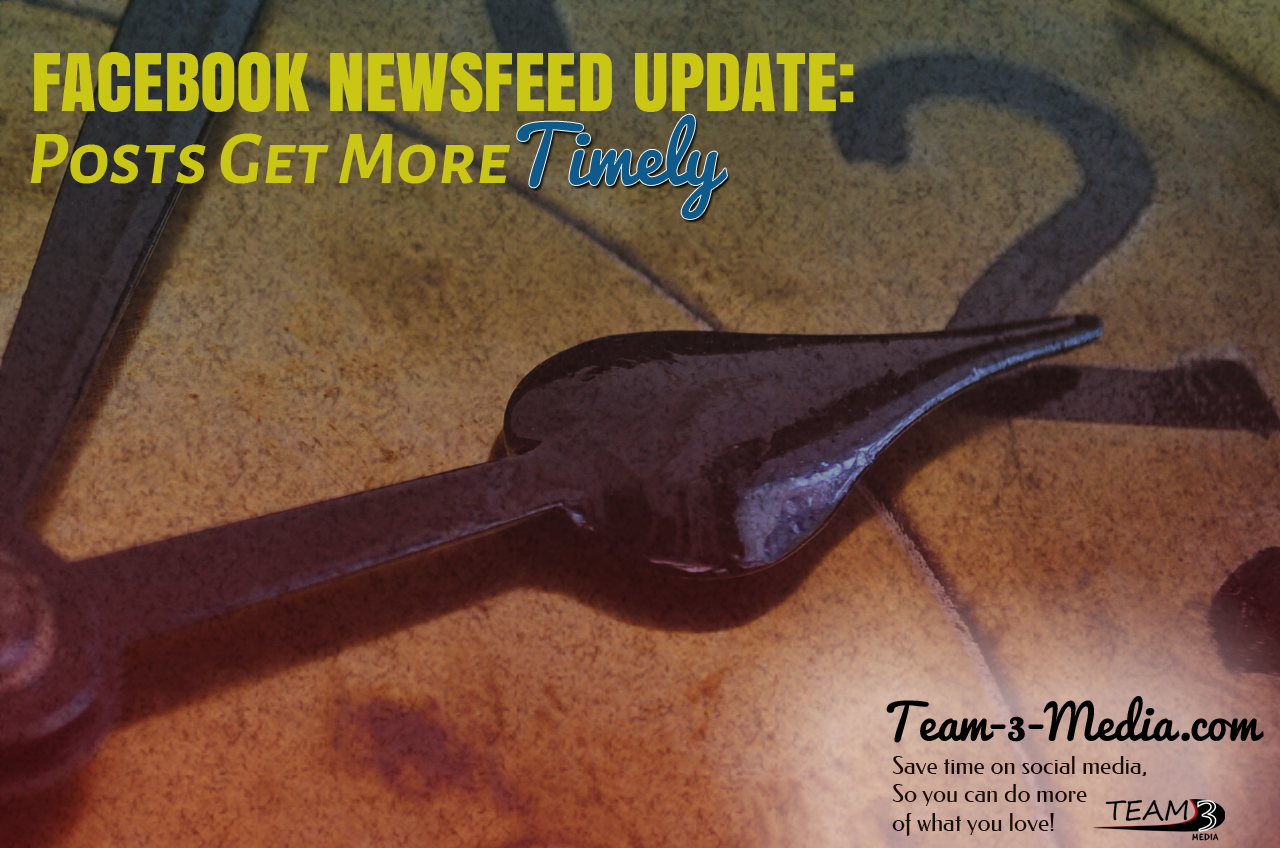 Facebook has updated its newsfeed again. But this time, it’s looking at posts in your newsfeed in a different way. Most of Facebook’s newsfeed updates revolve around what type of content shows up there. This time, however, Facebook is focusing on the timing of that content. Here’s an example. Let’s say that one of your friends graduates. They post their obligatory parent/graduate picture. It gets a ton of likes, comments, and shares within the first couple of hours. It might continue to get more engagement throughout the day and into the next. Sometimes, the engagement goes a little further, but not much. This particular post was very popular in and shortly after that moment, but not really later on. In other words, the timeliness of user’s behavior is starting to factor into how often and when Facebook shows posts in your newsfeed.
Facebook has updated its newsfeed again. But this time, it’s looking at posts in your newsfeed in a different way. Most of Facebook’s newsfeed updates revolve around what type of content shows up there. This time, however, Facebook is focusing on the timing of that content. Here’s an example. Let’s say that one of your friends graduates. They post their obligatory parent/graduate picture. It gets a ton of likes, comments, and shares within the first couple of hours. It might continue to get more engagement throughout the day and into the next. Sometimes, the engagement goes a little further, but not much. This particular post was very popular in and shortly after that moment, but not really later on. In other words, the timeliness of user’s behavior is starting to factor into how often and when Facebook shows posts in your newsfeed.
Trending Topics and What This Could Mean For Your Business
This “trending topics” update could also be good for businesses as well. Though I am (mostly) against “newsjacking”, that’s when a person or a business reports or comments on a story that has already broken, for the sake of putting out content, it has proven to generate traffic (and sometimes leads) if it’s related to your business. What could this change mean for your business on Facebook, though? If you post about something that is getting a lot of engagement right now, you could give your Facebook Page a temporary “boost”. This could be good news for those that are looking to increase the reach of their Facebook Page.
Don’t Screw it Up!
Tweet This: You may get more eyeballs on your content, but it might not be the right eyeballs
Here’s How I Would Use It
20 Ways You Can Get More Likes On Your Facebook Page

Think it’s hard to get more Facebook Likes? Try out these twenty tactics to get more likes on your Facebook Page for life.
- Add a “Like” button to your website.
- Put your Facebook Page link on your business card.
- Put a QR code (pointing to your Facebook Page) on any printed advertisement.
- Interact with another page on Facebook (while logged into your Page).
- Post more content on your Facebook Page.
- Embed a Facebook post on your blog or website.
- Put a “follow” button at the top of every website page.
- Put a “follow” button at the bottom of every blog post.
- Add a Facebook share button to every blog post and website page.
- Share your Facebook Page content to your personal Facebook profile.
- Add your Facebook Page link to your invoices (especially if you send them by email).
- Add a paragraph about what fans will get if they like your Page (i.e. coupons, free tips, updates on new products or services) to the about section.
- Write a post that’s controversial.
- Use Facebook ads to get more Likes to your Page.
- Add a “follow” button to your marketing emails.
- Add a link to your Facebook Page to the signature of your emails.
- Share your Facebook link on your other social media sites.
- Promote or “boost” a post from your Facebook Page. Bonus points if you promote a post that got a lot of engagement.
- Add a “Like” box to your website or blog.
- Promote a Facebook post that did well, by linking to it on your other social media networks.
Why Voice is So Important in Your Social Media Plan
Your voice matters. I can’t say that enough. In fact, let me say it again. Your. Voice. Matters. When you separate out the words like that, it not only looks more important, it sounds different. There’s a reason for this. Each word means something all by itself. Let’s tackle them one by one to get a deeper meaning.
Your.
This is an obvious word, but does bare a deeper look. First of all your voice will be different than anyone else’s. I think this should go without saying, but sometimes saying it helps us to understand that each of us has something unique to say. Let’s look at an example. We have two different business owners: Steve and Bob. Steve and Bob are the same age. They both grew up in the same small town. They went to the same school, and they had (for the most part) the same friends. They graduated in the same year and went to the same college in a neighboring city. Early on, they both realized that they loved to cook. So, when they got out of college they both started restaurants. But Steve and Bob are different people. Steve’s family life was not so great. He had a brother and a sister, and a mother and father who fought a lot. So, he learned to cook at an early age because that was his job and it was how he kept his family together. Bob is an only child. His parents were like a dream come true. In fact, they are his best friends. Bob learned to cook from his uncle who was a chef and used to visit in between trips around the world. Bob was fascinated by the dishes his uncle prepared, which were often exotic. Bob grew up trying to imitate the dishes his uncle would create during his visits. Steve’s necessity in cooking grew into a love of providing food to bring people closer together. Bob’s love of cooking grew into a passion for introducing exotic food to his small town. Can you start to see how each of these two men would not only open a different kind of restaurant but how they might have a completely different opinion on what to serve in those restaurants? Now imagine what each of these men’s blogs would be about. Do you think they would be different? Do you think they might even cover different subjects? Maybe Steve would write about his own budding family and how he is teaching his children to cook and prepare meals in a family setting. Maybe Bob would showcase a different meal he’s prepared each week.
The point is that each person is different for many different reasons. And that’s a good thing, because that means that content written by each person would not be a carbon-copy of someone else’s. Can you imagine what it would be like if you landed on a blog about cooking and found that it was almost exactly like another blog that you read about cooking? How boring and annoying would that be?
Find out what sets you apart or makes you different, and then put that into whatever you write.
Voice.
Voice itself is important because voice, sometimes even more than opinion, is what sets you apart from someone else. This can be influenced by opinion, but is more to do with your writing style and the words you use. I write in a more conversational tone. Someone else might write in a more formal one. Even if we wrote an article about the same subject, it would read in a completely different way because we used different words. You should choose a voice that feels comfortable to you when you write. If you like to tell jokes, then make sure you put jokes in your writing. It will make it much easier to produce content because it comes more naturally to you. Whatever you do, make sure your voice is consistent. That doesn’t mean that you can’t deviate occasionally. What it does mean is that your content will be recognizable to people across different platforms (i.e. Facebook, Twitter, your blog). It also means that someone who is used to reading what you write does not have to work as hard to understand what you’re saying. When you remove that obstacle, it makes reading much more enjoyable and they will be more likely to come back for more.
Matters.
Your voice does matter. What you say matters. The way you say it matters. And if you want to do something that matters, then using your unique voice to talk about it is the only way to connect with people. You don’t have to change the world to do something that matters. You just need to do something that matters to you. Once you know what that is, making sure that it shows up in your writing is key. In other words, write whatever you are passionate about. Writing about things that matter to you will also make the writing easier, because you already know and are excited about the subject. People also connect better with someone who writes passionately about a subject, because they can read that in your writing.
How Can You Apply This to Your Social Media Plan?
There is nothing better you can do for your social media plan than to find your unique voice and subject matter. It is one of the main things that will make you stand out from your competitors. Just posting is not enough you have to stand out. Use these three steps below to create content for your social media plan and you’ll see results.
1. Find your.
Figure out what makes you different. Write those facts down and use that angle to make what you say unique to you.
2. Your Voice.
Choose a voice that you’re comfortable with. You don’t need to win a Pulitzer with your voice. That would be awesome, though, right? You just need to find a voice that fits you and your audience.
3. What Matters.
Even with their similarities, the two men in the example above had different things that mattered to them. It’s part of what would set their different content apart. Find out what matters to you and make sure you write about it.
I’d like to know your results.
If you will or have implemented these steps, let me know what your results are in the comments below.

